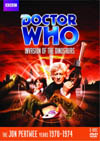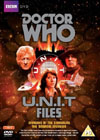DVD Features include:
The Moody Tangent of Part OneThe elusive first episode achieves a lonely, spooky, something's-not-quite-right atmosphere similar to the exposition of the parallel universe in "Inferno" (story no. 54) or Gatwick Airport's mystery from "The Faceless Ones" (story no. 35), and director Paddy Russell's production team succeeds remarkably well in bringing this to the screen. Such an atmosphere is definitely a worthwhile aim from the script. Is it actually a bonus that this moody first episode is so often presented to modern viewers in black and white? Does colour detract from the atmosphere? This episode hasn't quite been treated to the same restoration as part three of "Planet of the Daleks" (story no. 68), but at least we still have the black and white version to compare it with.Sadly, half of the Doctor and Sarah's episode one screentime is later padded with old routine capture-and-escape dynamics, once again unabashedly sporting Hulke's habitual bad-listener stereotype characters and the Doctor's resignation to the assumption that no one will believe him thus motivating him to not make much effort to explain himself properly. This revolting Hulke habit, however, is impossible to sustain with the Brigadier holding such a high-level influence in the situation, and indeed it is strange that it came up at all. Since the Brigadier has pinned all his hopes for progress on the possibility that the Doctor will turn up and give him some leads, you'd think that all the troops would have escorting him safely in written into standing orders, priority A1. Mike Yates gets strange treatment in episode one, particularly as he has such a pivotal chapter in his series character arc in this story. The novelization doesn't mention him at all in the episode one segments, while on television, he suffers a repeat of the problem he had in his debut episode in "Terror of the Autons" (story no. 55), namely that the camera can't seem to show the viewers his face no matter how much of a focus he deserves when delivering his lines. Weird. I also wonder why the production team thought they could keep the dinosaurs a secret by changing episode one's story title to just plain "Invasion". Surely the pterodactyl appearing half-way through episode one gives the game away! ...Not to mention that the Tyranosaurus makes his explosive entrance long before the climax of the episode. They may as well have left the story title the way it was! Thankfully, this is the last Doctor Who episode to suffer from a lack of proper archiving at the BBC - everything from here on is available complete in its original form....
"Is everyone in on this conspiracy?"It's funny how our protagonists are surrounded so completely by disguised villains pretending to help them. Then again, the honest people have all been evacuated, haven't they? Hulke spends a lot of time using all these conspirators to knock our heroes back to square one over and over again. The struggle with this kind of conflict is that it may easily become repetitive and boring, or it may need to go off topic in order to remain interesting, or perhaps there is enough substance to the main issues at hand that being knocked backward and going through it again can give us some worthwhile depths to explore. This time around, Hulke's script does a bit of all of the above, even if it also has to do backflips and somersaults to hang on to the logic of it all. Putting Sarah into the spaceship community is not a smart move on the villains' part at all, but then again they're not really heartless and cold enough to bump off someone who's standing there in front of them. The plus of it is that Sarah has a completely new, interesting, thematically related square one to start moving forward from, which certainly works to keep audiences interested. Accusing the Doctor of being the villain is an example of distraction, little more than an excuse for some location action. Although the action is pulled off fairly well, it really does slow down the plot, and I have fallen asleep during this part of the story on one occasion. Mike Yates' early sabotage, and his resistance to making it become violent, are interesting for the sake of his character as well as the plot. Sabotage by other conspirators continues, and starts to become the repetitive and boring type. Quite often, there is no adequate explanation for how they could possibly keep their own hands clean of the blame.The dinosaurs themselves are much maligned. Personally, I think most of the puppet monsters fulfill their character roles adequately. I mean, the brontosaurus is supposed to be large, placid, and stupid, and it is. Most of the other pleasant herbivores are equally successful in bringing their characterizations to life. It is chiefly the Tyrannosaurus Rex that lets the show down, because the required shots were simply not accomplished with him at all. He needs to be a major threat, therefore he needs to advance on camera POV's and move in on his prey or his attackers, and he's almost always either standing still or retreating. He really doesn't work at all, except perhaps when he bursts through a wall (in other words, advancing on the camera). The pterodactyl is a completely different process. His scenes manage to work, but aren't really inspiring either, as he is off screen most of the time, and playing the role of a distraction. Footage of the new Whomobile is surprisingly limited. When the Doctor finally asks for it in episode four, and the Brigadier asks if he wouldn't prefer a jeep, the big question I have is why the Doctor DID ask the Brigadier to "lay on a jeep for me" in the previous episode?
A New Frame for the Trap of a Worthy ThemeThere's a lot of "doomsaying" in this story, but thankfully it is given to Mike Yates and the villains, and is sympathetically frowned upon by the Doctor and Sarah. Although one gets the sense that Hulke is using these villains to voice many of his own environmental and social concerns yet again, this particular script shows the one-sided, disgruntled system-bashing for what it is in the end, an indication that Hulke has gained more wisdom towards these issues than his earlier scripts may have let on. The Doctor's final statement to Mike Yates on these issues, expertly zoomed in on, does a nice job of setting the record straight on Hulke's true beliefs. Unfortunately, screen time is still divided 95% on how not to solve society's problems, and 5% on a better way of going about it which is left a little vague, so the point can still easily be lost. "The Green Death" (story no. 69) gave about 50% of its philosophy time to Professor Jones and the Nut Hutch, expounding on some researched methods of doing things better, resulting in it having a greater and more memorable impact in the end.The confrontation with Yates is one of the best bits of the story's conclusion, but the rest lacks a certain delivery. In particular, Professor Whitaker and his assistant Butler have been isolated from the protagonists all throughout the story, and the Doctor's efforts from episode two onward have been to locate and confront them. Anticipation for that confrontation is thus built up to a high level by the time the final episode rolls. In my opinion, Hulke still throws too many barriers in front of the Doctor and UNIT in the final episode, delaying that confrontation far too long until there isn't any screen time left to do it justice. These barriers consist of more dinosaur encounters, which haven't really grown any greater or more intense since the first episode and thus simply seem repetitive, or boring distractions such as re-opening an elevator shaft that should have been dealt with two episodes ago. Sarah's space pioneer subplot advances nicely, further building towards the pioneers' desire to confront Whitaker, Butler, and Grover. When this major concluding confrontation finally takes place, and everyone storms into the room, Hulke pulls another huge cop-out of an ending on us. First, nobody gets to say anything, or put the main philosophical issues into an open and honest debate, and neither is there any satisfying action for the UNIT troops to engage in. The role of Sarah and the space pioneers reminds me very strongly of Ian and the underground Optera from "The Web Planet" (story no. 13), in that a regular character spends half a story grooming an isolated group of locals to rebel against their oppressors, and then they all show up at the very last minute and contribute absolutely nothing to the villains' downfall. Sarah's group fares a bit better, as their struggle was at least relevant to the story's main themes, and breaking free of the villains' brainwashing is at least a victory in itself, but the general dynamic still leaves a lot to be desired. Basically the villains here simply pull their master-switch and win. It isn't very believable that the Doctor alone should be immune, particularly by simply being at least half alien. This is all a very contrived and arbitrary way of allowing him to single-handedly save everyone at the last minute. Then the villains promptly take care of themselves and vanish into their "Golden Age". An additional scene of them getting eaten by dinosaurs would have been (A) poetic justice, (B) a more justified and interesting use of dinosaur screen time, and (C) an excellent demonstration of the Doctor's point that no previous age, golden or whatever, is particularly better than the one they were in to begin with. Live in the now. The point could have been made with action and not just with dialogue. Once again, for my tastes Hulke has been a little too stingy with enjoyable payoffs and triumphs for his protagonists, as well as "educational-warning" style failures for his villains. In particular I believe that if a villain has misguided concepts for how to make things better, these become excellent reasons for the eventual failure of his plans that should be highlighted. Hulke rather blindly builds his villains as all-powerful, and defeats them by chance or with equal villainy from the protagonists.
A short list of Malcolm Hulke stories, ranked from best to worst:
-The War Games (with Terrance Dicks)
-The Silurians
-The Faceless Ones (with David Ellis)
-Colony in Space
-Invasion of the Dinosaurs
-The Sea Devils
-Frontier in Space
International Titles:Deutsch: (Invasion der Dinosaurier)Magyar: "Dinoszauruszok inváziója"Français: (L'Invasion des Dinosaures)Русский: "Вторжение динозавров"English Part 1: "Invasion"English Parts 2-6: "Invasion of the Dinosaurs"English Novelization: "The Dinosaur Invasion"This story is available on DVD and VHS video. If you've only seen it on TV in syndication, they probably left out the REAL episode one. Get yourself all six episodes on DVD or VHS video and enjoy it closer to the way it was meant to be seen!
Comments on this article are welcome. You may contact the author from this page:
|
||||||||||||||||||||||||||||||||









